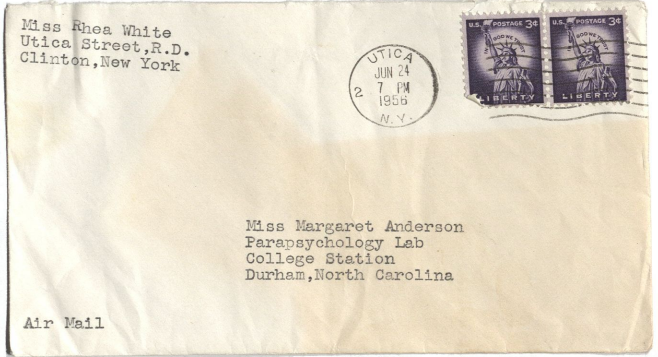Contributed by Courtney Block, Faculty, Indiana University Southeast Library; 2023-24 Recipient of a Harry H. Harkins T’73 Travel Grant for Lesbian, Gay, Bisexual, and Transgender History
During my sabbatical in Fall 2022, I travelled to the Rubenstein Library to research items from the Parapsychology Lab Records. Specifically interested in learning more about women in the field’s timeline, I was most eager to find materials pertaining to Rhea A. White (1931-2007), researcher, author, and librarian. As a librarian and author myself, I felt a connection to Rhea. I knew that Rhea worked at the Duke Parapsychology Labs and was a prolific figure who conducted original research, served as editor of the Journal of the American Society for Psychical Research, and authored several books. What I didn’t know (and was able to access during my time at the archives) is that in the 1950s Rhea wrote nearly 70 pages worth of love letters to her co-researcher Margaret L. Anderson. In these letters, Rhea not only discusses her feelings for Margaret (Marg), but also discusses her near-death experience, dismantles gender binaries, and even reveals that J.B. Rhine once asked her to keep an eye out for certain behavior so that the labs wouldn’t be mired in “scandal.”
My time spent with these letters and the continued research they have set the path for reminds me of a concept that Rhea developed in the 1990s called ‘exceptional human experiences (EHEs).’ Rhea defines EHEs as “a class of spontaneously occurring, unusual experiences.”[i] At the crux of an EHE is its ability to “change the way the experiencer behaves or feels or thinks about [themself], other people, other organisms, and attitudes toward or ideas about the meaning of self, life, death, and other subjects of deep human import that the ordinary person does not have time to ponder deeply, if at all.”[ii] Reading the letters was an exceptional human experience and researching Rhea and Marg’s lives continues to be one as well.
[i] Genie Palmer & William Braud. “Exceptional Human Experiences, Disclosure, and a More Inclusive View of Physical, Psychological, and Spiritual Well-Being.” Journal of Transpersonal Psychology 34(1): 2002. 30.
[ii] Rhea A. White. “The Human Component in Exceptional Experience.” Journal of Religion and Psychical Research 20(1): January 1997. 24.


